about 1 month
ago -
PDX Chakerathe
-
Direct link
Greetings all,
Before we venture into the country content today, I want to take a brief moment to discuss the reactions to last week’s development diary. For those who didn’t follow the situation, it would be fair to say that some of the material we presented elicited strong negative reactions from parts of the community. This is not unusual, in fact I’d go so far as to say that it’s one of the reasons we have dev diaries in the first place. Well intentioned feedback is a good thing. We won’t always agree on what the best directions are for a game, but I think we’ve repeatedly shown that airing content early in dev diaries can be a source of positive change for the content within.
However.
It would also be fair to say that for the last couple of releases, dev diaries have happened much later in the development process than they used to. This makes it harder for us to make certain, more significant changes based on the feedback we get. I am not happy with this. We will make changes.
With all of the above said we do still use dev diaries as a medium for change, and we’ve taken on board the community’s thoughts around the Silk Road Empire path, and will be altering this to fit a more historically inspired vision. You can find details of this below the text for the upcoming Afghanistan content, and then we’ll continue with the upcoming Iraq content.
As a final note however, there is an unpleasant undercurrent to some of the reactions we’ve received this week. A minority of players have resorted to threats, harassment, and organized personal attacks far outside what I would consider appropriate or acceptable online behaviour, in order to compel us to make changes to the game. As a rule, we do not respond to demands that are accompanied by harassment or threats. Instead, as displayed above, it is constructive feedback that is most likely to result in changes.
Arheo
---
Hi there! Here are two of our new focus trees arriving in Graveyard of Empires.
Explore historical and alternative paths as your nation grapples with unstable politics, external pressures, and a rugged landscape.
Or perhaps you prefer to shape the fate of the Hashemite monarchy, navigate military conspiracies, and determine whether Iraq will bow to foreign interests or carve out its own destiny.
Afghanistan First we have one of the most intriguing and overlooked nations of Hearts of Iron IV: Afghanistan.
Known as the "Graveyard of Empires," Afghanistan sits at the crossroads of Asia, surrounded by powerful neighbors with competing interests. In Graveyard of Empires, Afghanistan gets a brand-new focus tree that offers players an array of historical and alternative paths, all while grappling with the nation's unique challenges: unstable politics, external pressures, and a rugged landscape that's as much an obstacle as it is a defense. Let’s dive into what makes this mountainous nation tick!

King Zahir Path: A Balancing Act If you choose to keep Afghanistan on its historical trajectory, your goal is to maintain neutrality while avoiding the unwanted attention of both the British Raj and the Soviet Union. It’s not an easy task—both neighbors see Afghanistan as a key piece in their great game of influence.

The historical path focuses on threading the needle diplomatically. You’ll work to modernize the state just enough to strengthen it without alarming the Soviets or British into intervening. Build up a defensive military, negotiate trade agreements, and play the long game. Survive the war intact, and you might just emerge as a stronger, more united Afghanistan ready to step onto the post-war stage. However, this branch also has options to depart from the historical trajectory by strengthening the young King Zahir Shah at the expense of his power hungry uncles.

This enables Afghanistan to move towards parliamentary democracy, or even a republic. Depending on choices made throughout this path, the establishment of a republic can allow Afghanistan to gain cores on more territory or transform into a new nation such as Pashtunistan. You may have also noticed the end focus called ‘Sinkiang Intervention’ which will allow alt-history Afghanistan to declare war and puppet Sinkiang. This is intended to be a follow on from the 1933 Afghan interventions in the region.

Modernization and Industry Afghanistan’s industrial branch is a delicate balancing act. On one hand, you have the rising middle class and reformers who demand modernization—factories, railroads, and a central government capable of governing effectively. On the other hand, the rural elite and tribal leaders expect the status quo to remain, fiercely opposing any changes that threaten their power or traditions.

As new universities are established (giving the player extra tech slots), their graduates will expect jobs. Otherwise they will turn to alternative ideologies in the form of a ticking national spirit, boosting parties opposed to the current government.
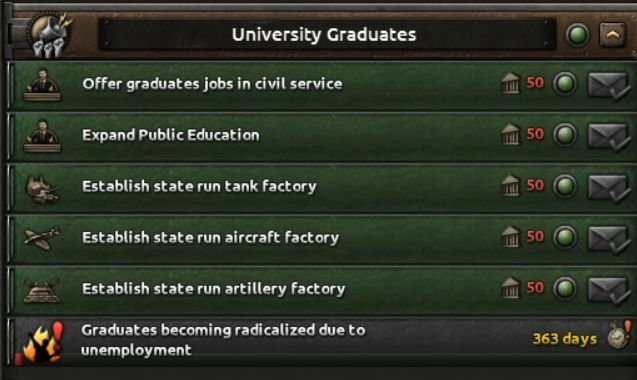
Failure to accommodate the needs of the graduates or the rural population can escalate even further, especially if Afghanistan has taken industrial aid from the Soviet Union.
To succeed, you’ll need to navigate these conflicting interests carefully. Alienate the traditionalists, and you risk plunging the nation into civil unrest. Ignore the reformers, and the country’s economy will stagnate, leaving you ill-prepared for the challenges of the modern world. Striking the right balance will be key to building a strong, stable Afghanistan capable of weathering the storms of the 20th century.
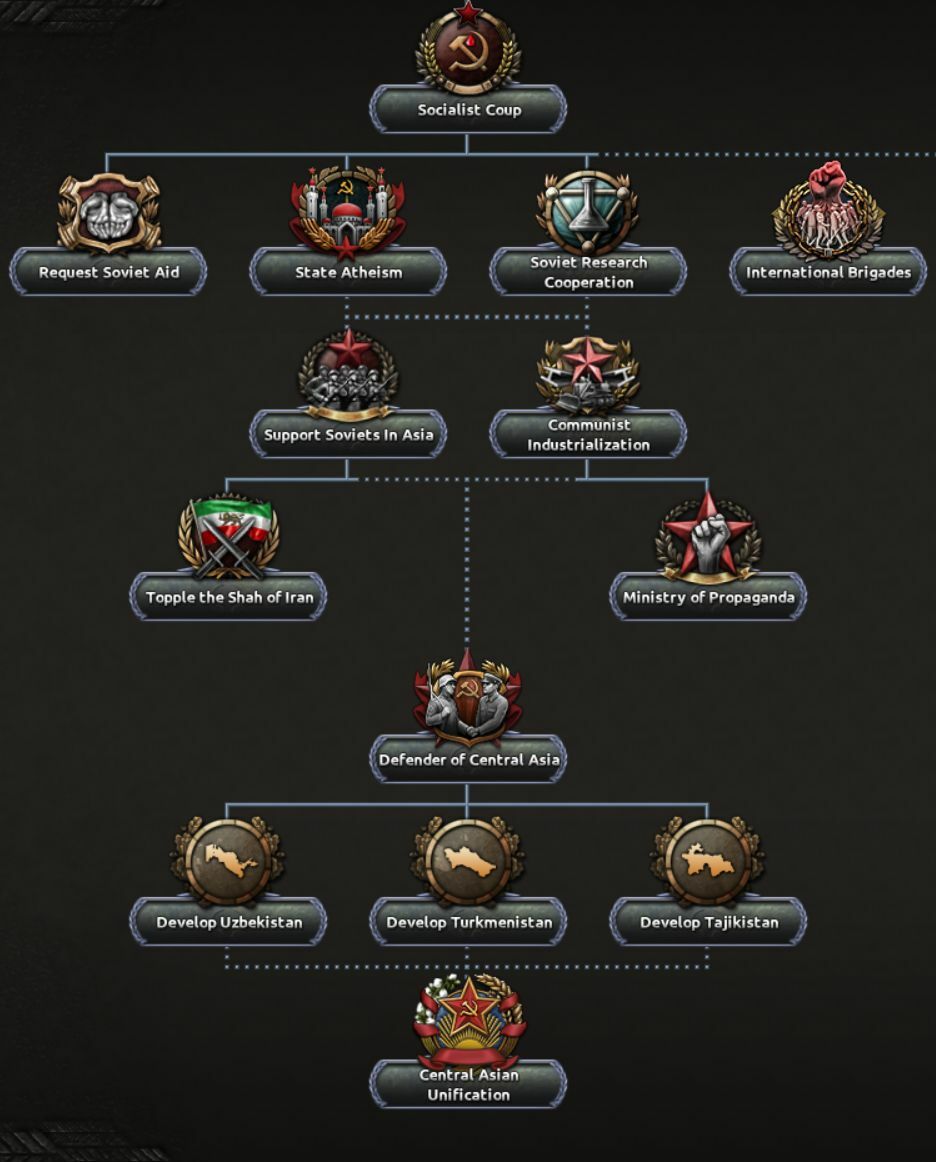
Red Revolution – The Communist Path On the opposite end of the spectrum lies the Communist path. Here, Afghanistan leans into its proximity to the Soviet Union and stages a workers’ revolution to overthrow the monarchy. With Soviet backing, you’ll focus on restructuring the nation into a socialist state, collectivizing agriculture, and using Soviet expertise to industrialize rapidly.
A successful Communist Afghanistan can join the Comintern, spreading revolution across South Asia. As a reward for securing your central Asia for the communist cause, Afghanistan can take control of Soviet states in central Asia and form a new communist state in the mountainous region.
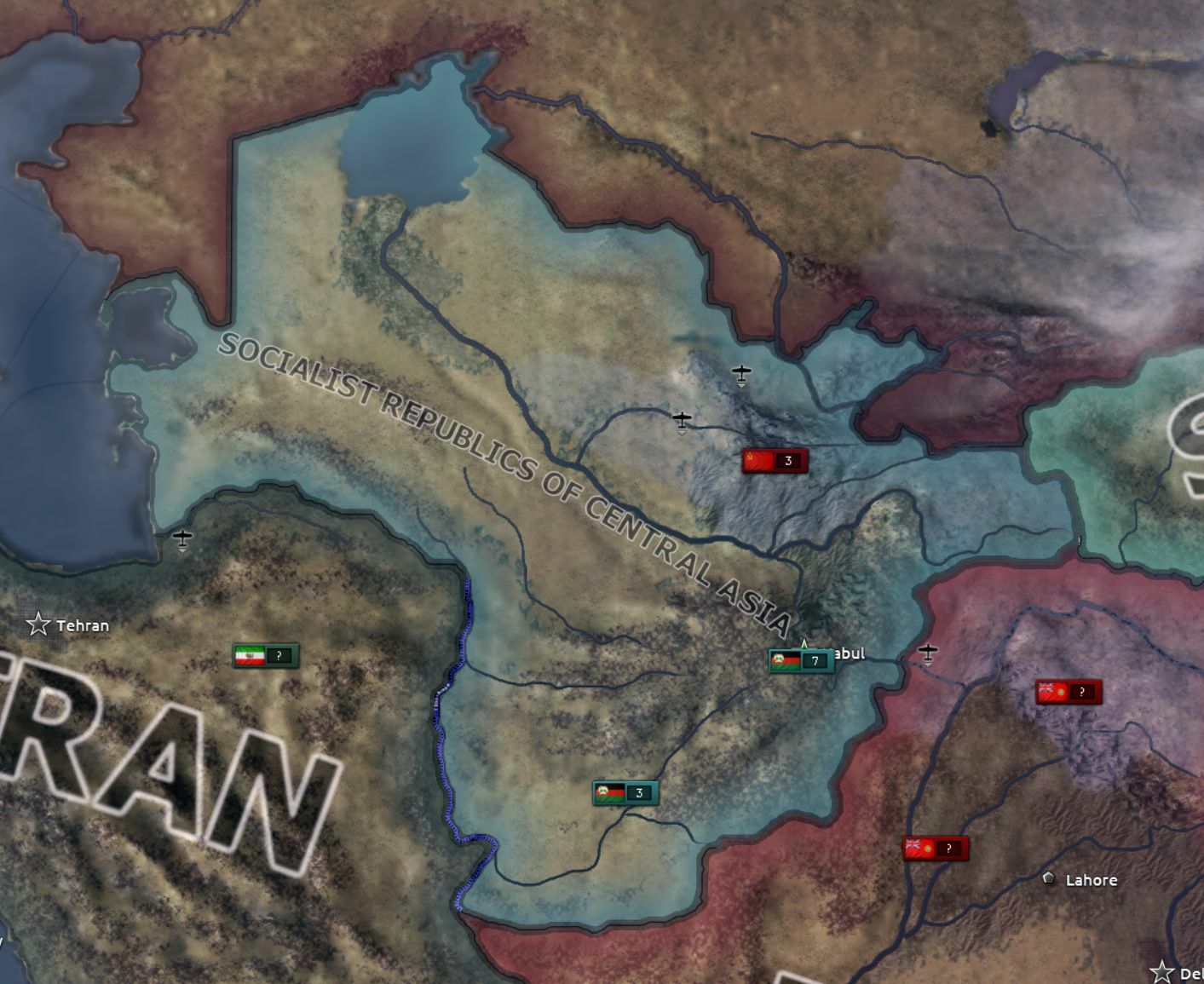
The Return of Amanullah Khan – The Fascist Path What if Afghanistan didn’t settle for neutrality? What if Amanullah Khan, the reformist monarch who was overthrown in 1929, returned to power with a vengeance? In this path, you’ll work to restore Amanullah’s throne, rally the country around his vision of modernity, and take Afghanistan in a radical new direction.

In order to restore Khan to the throne, players will have to rally support from those opposed to the current regime and potentially sway Germany into supporting you. When the time is right, Khan will need to use his support to violently overthrow the government in a civil war.
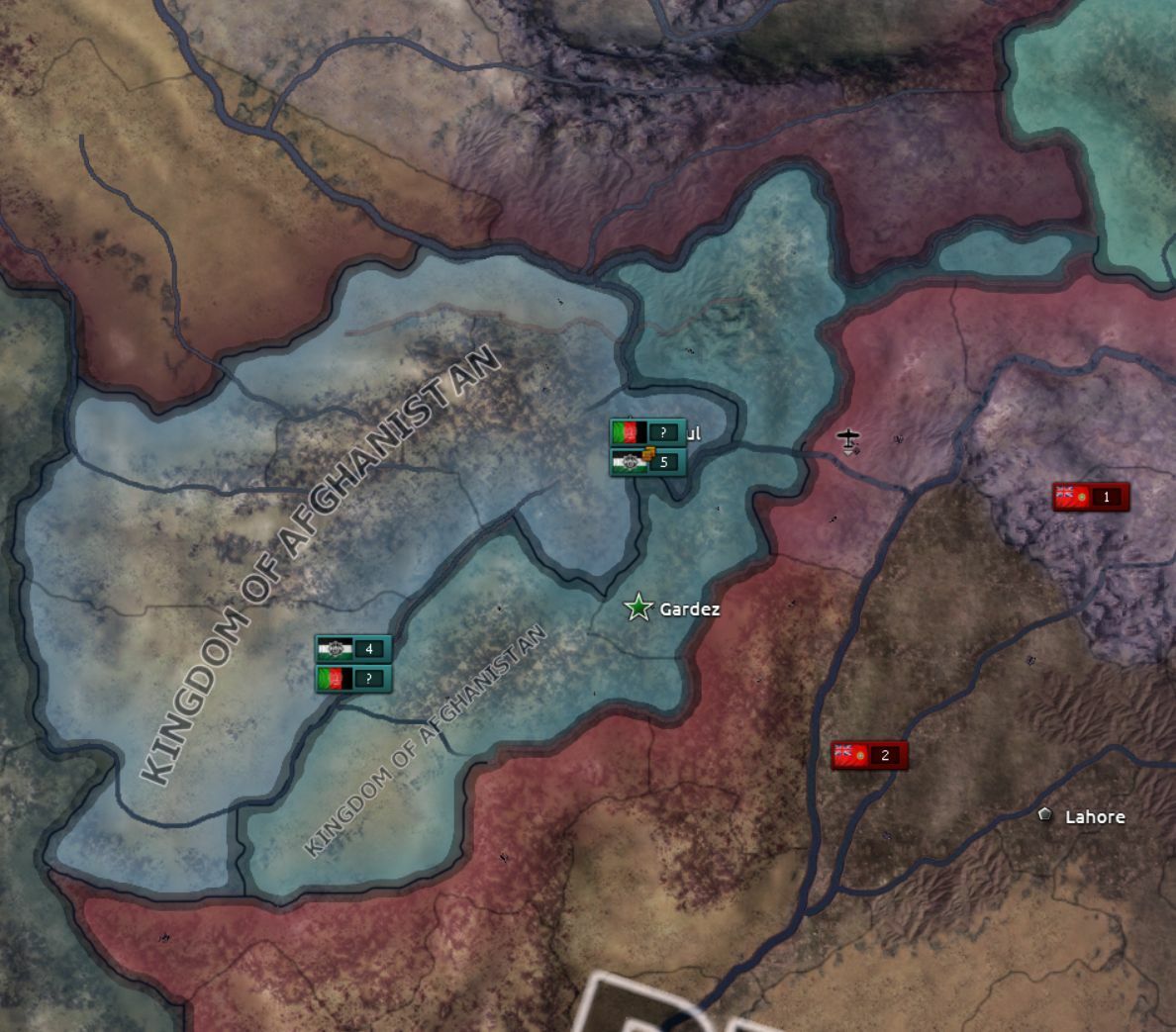
But modernization comes at a cost. To industrialize the nation, you’ll need to crush traditionalist opposition and whip the economy into shape. Amanullah’s reforms will bring social upheaval, from building factories in the cities to empowering women and expanding education—an effort that will alienate the rural elite and test the patience of the clergy.

Once industrialized and militarized, Afghanistan can align itself with the Axis, contributing to their war effort and expanding its influence in Central Asia at the expense of the Soviet Union or push South and dominate the Indian sub-continent.
Military Traditions: Levy vs. Professional Army Afghanistan’s military tree offers two distinct paths. Will you maintain the traditional levy-based army that draws upon local tribes and their age-old knowledge of guerrilla warfare? Or will you modernize, creating a professional standing army equipped with artillery, tanks, and aircraft?

The levy path excels at defensive warfare and is perfect for players who want to hold out against more powerful foes in Afghanistan’s rugged terrain without reliance on an industrial economy. Meanwhile, the professional army path allows for a more offensive playstyle, but modernization requires major investment in infrastructure, industry, and training. Both paths have their advantages, and choosing the right one will depend on the challenges you face.
Afghanistan Conclusion Afghanistan might not be the biggest player on the world stage, but its unique challenges and opportunities make it a fascinating nation to lead in Hearts of Iron IV. Whether you choose to maintain its neutrality, dive into reformist authoritarianism, or embrace radical socialism, Afghanistan offers a fresh and engaging experience for players who enjoy navigating the complexities of geopolitics and internal strife.
Some Raj changes We have implemented some changes to the Raj’s alt-history branches following feedback in the previous developer diary. So let’s take a quick detour from Afghanistan to see what’s changed.
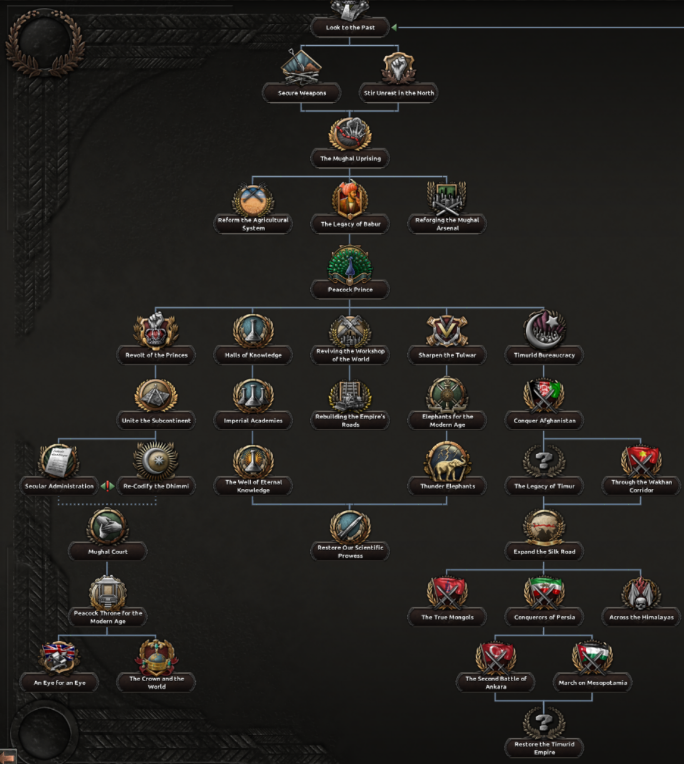
As you can see, the Mughal branch has changed structure somewhat. After breaking away from the Raj in a war of independence, you will start off as a lonesome Princely State. After this you choose who you want to rule your new state. This will include an option to promote the historical heir of the Timurid Empire, Mirza Khurshid Jah Bahadur. Furthermore, we’ve also enforced stricter rules for who can be leader to only include non-hindu princes.

Then we have two paths you can take in this branch, embracing Mughal heritage and becoming a new Mughal Empire and striving to unite the Indian Sub-Continent under your rule (as we discussed last week), or striking north and west in the form of a resurrected Timurid empire.

The Timurid path allows you to move the capital into Afghanistan and promotes the expansion into former Timurid territory in central Asia, Iran, Turkey and Iraq. Included in this path is an option to expand the silk road across your conquered territory by establishing new railway lines towards your capital.

Iraq Next up, we set our sights on a nation caught in the whirlwind of great power politics, a land rich in oil but plagued by instability—Iraq. With the Graveyard of Empires Country Pack, Iraq receives a new and dynamic focus tree that allows players to shape the fate of the Hashemite monarchy, navigate the shadows of military conspiracies, and determine whether Iraq will bow to foreign interests or carve out its own destiny.

Will you secure Britain’s favor and build a Hashemite empire? Will you break free from imperial control and forge a regional alliance? Or will you embrace radical nationalism and set the Arab world aflame? The choice is yours. Let’s dive in!
The Hashemite Gamble: A Crown in Exchange for Chains? Iraq's Hashemite monarchy exists in a precarious position. Installed by the British in the aftermath of the First World War, it must balance between maintaining legitimacy at home and keeping the favor of its foreign patrons. Walking this tightrope offers both risks and rewards.

If you choose to cozy up to London, you’ll gain economic and military support in exchange for certain… “adjustments” to your sovereignty. Gradual territorial concessions and agreements on oil will ensure a steady flow of British investment, arming and industrializing Iraq under the watchful eyes of the Empire.
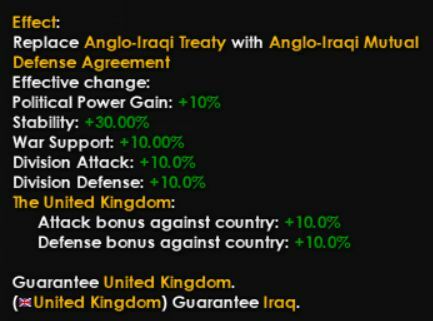
However, this road does not have to end in subservience. With careful diplomacy and statecraft, Iraq can leverage British support to expand Hashemite rule, either through the creation of a Hashemite Federation that unites Iraq and Transjordan, or by pursuing an even more ambitious vision—the restoration of the Hashemite Caliphate, using British backing to lay claim to leadership of the Islamic world.
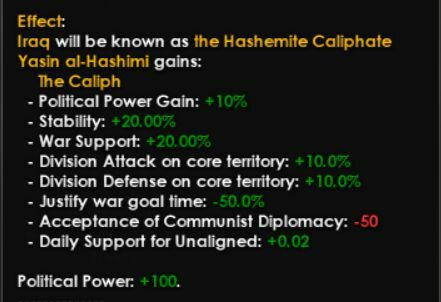
Of course, the longer British troops remain in Iraq, the more resentment will fester among the people. Can you keep the monarchy secure, or will the streets of Baghdad boil over with nationalist fury?
The Coup of Bakr Sidqi For those who see Iraq’s reliance on Britain as a chain rather than an opportunity, there is another path—the military coup of General Bakr Sidqi. Historically Iraq’s first modern military dictator, Sidqi represents a new direction for the country.
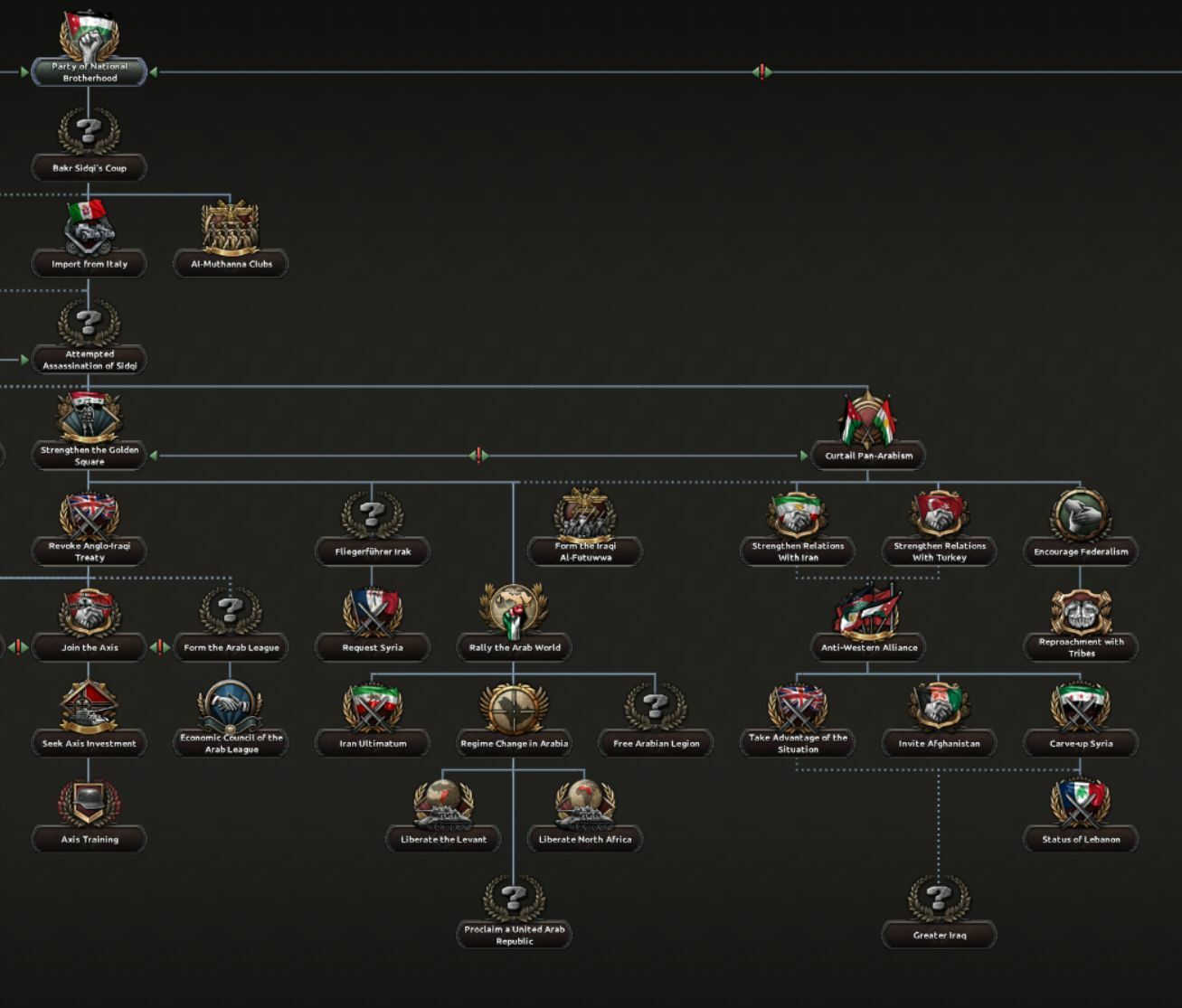
By backing his coup, you can turn Iraq into an independent and militarized power, rejecting foreign interference in favor of forging an alliance with Turkey and Iran—the two other regional powers wary of British and Soviet ambitions. Together, these nations can stand united against imperialist forces, ensuring their survival in a world dominated by global giants.

This path requires careful diplomacy and a willingness to challenge British influence while avoiding outright war until you are ready. If played correctly, Iraq can become the dominant force in the Middle East without being anyone’s pawn.
The Golden Square Coup: A Pan-Arab Uprising Then again, why stop at simply kicking out the British when you can set the entire Arab world on fire?
By supporting the Golden Square, a group of radical officers inspired by fascism and Arab nationalism, you can overthrow the Hashemite monarchy and transform Iraq into the spearhead of a new Pan-Arab movement. Historically, this coup led Iraq into a short-lived war with Britain, but with the right moves, you can turn it into something much greater.

By throwing your lot in with the Axis, you can rally the Arab world against imperialist powers, using German support to launch military campaigns aimed at unifying the Middle East under Iraqi rule. With enough ambition (and firepower), you could redraw the map entirely, casting aside the artificial borders left behind by the colonial powers.
However, the enemies you make along the way will not take this lightly. Can you survive the wrath of the British, the Turks, and the Persians long enough to build a truly united Arab state?
Black Gold and Industry: The Future of Iraq Regardless of which path you take, one thing remains true—Iraq sits atop one of the most valuable resources in the world.
The oil fields of Iraq can be exploited to fund rapid industrialization, equipping your armies and fueling economic expansion. However, how you wield this wealth depends on your political situation.
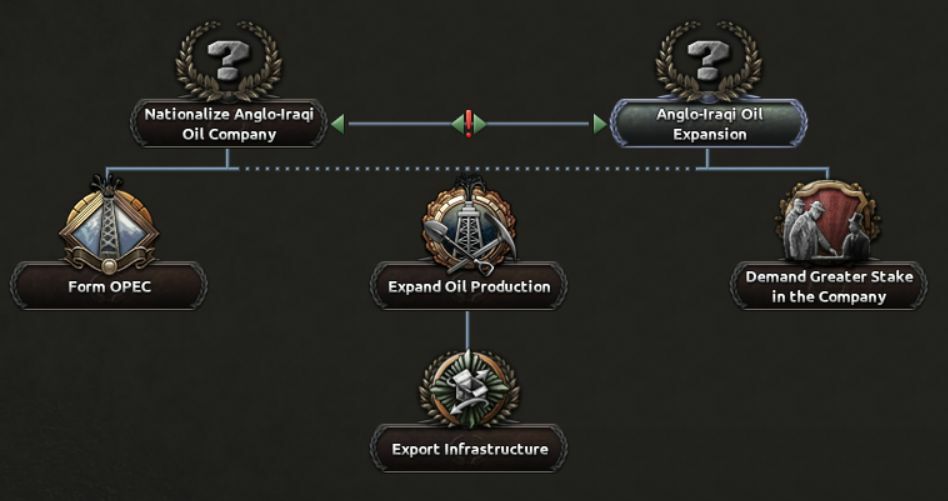
British-aligned Iraq will see much of its oil wealth siphoned off in exchange for industrial and military aid. A militarized independent Iraq will need to develop its own petroleum industry, relying on domestic initiatives to fuel its growth.Meanwhile fascist Iraq aligned with the Axis can use oil as leverage, trading with Germany and Italy to secure weapons and infrastructure.
Oil is both a blessing and a curse—manage it well, and you will have the means to build a modern nation. Fail, and Iraq could become an imperialist puppet once more.
Relations with Britain: A Delicate Dance The defining factor in Iraq’s fate will be how you handle your relationship with the British. Every path—monarchist, militarist, nationalist—hinges on whether you cooperate with London, cautiously distance yourself, or declare open war.
Tolerate the British, and you can leverage their support for Iraq’s modernization.
Resist them diplomatically, and you may carve out an independent position without bloodshed.
Defy them completely, and you had better be ready to fight. An enraged Britain has the means to crush Iraq if provoked too soon so timing is everything.
Final Thoughts Iraq is a nation brimming with potential and danger. Sandwiched between great powers, blessed with vast oil reserves, and divided between competing political movements, it is a country poised for either greatness or destruction.
Whether you choose to guide the Hashemites to glory, back a military dictatorship, or forge a radical Arab empire, Graveyard of Empires offers players the chance to rewrite Iraq’s fate.
Which path will you take? Will you play the loyal subject, the cunning strategist, or the revolutionary firebrand? Let us know in the comments below!
Until next time—may your oil flow freely, and your enemies tremble before you!
If you haven't already, check out the Expansion pass by clicking here, or the picture above!
Before we venture into the country content today, I want to take a brief moment to discuss the reactions to last week’s development diary. For those who didn’t follow the situation, it would be fair to say that some of the material we presented elicited strong negative reactions from parts of the community. This is not unusual, in fact I’d go so far as to say that it’s one of the reasons we have dev diaries in the first place. Well intentioned feedback is a good thing. We won’t always agree on what the best directions are for a game, but I think we’ve repeatedly shown that airing content early in dev diaries can be a source of positive change for the content within.
However.
It would also be fair to say that for the last couple of releases, dev diaries have happened much later in the development process than they used to. This makes it harder for us to make certain, more significant changes based on the feedback we get. I am not happy with this. We will make changes.
With all of the above said we do still use dev diaries as a medium for change, and we’ve taken on board the community’s thoughts around the Silk Road Empire path, and will be altering this to fit a more historically inspired vision. You can find details of this below the text for the upcoming Afghanistan content, and then we’ll continue with the upcoming Iraq content.
As a final note however, there is an unpleasant undercurrent to some of the reactions we’ve received this week. A minority of players have resorted to threats, harassment, and organized personal attacks far outside what I would consider appropriate or acceptable online behaviour, in order to compel us to make changes to the game. As a rule, we do not respond to demands that are accompanied by harassment or threats. Instead, as displayed above, it is constructive feedback that is most likely to result in changes.
Arheo
---
Hi there! Here are two of our new focus trees arriving in Graveyard of Empires.
Explore historical and alternative paths as your nation grapples with unstable politics, external pressures, and a rugged landscape.
Or perhaps you prefer to shape the fate of the Hashemite monarchy, navigate military conspiracies, and determine whether Iraq will bow to foreign interests or carve out its own destiny.
Afghanistan First we have one of the most intriguing and overlooked nations of Hearts of Iron IV: Afghanistan.
Known as the "Graveyard of Empires," Afghanistan sits at the crossroads of Asia, surrounded by powerful neighbors with competing interests. In Graveyard of Empires, Afghanistan gets a brand-new focus tree that offers players an array of historical and alternative paths, all while grappling with the nation's unique challenges: unstable politics, external pressures, and a rugged landscape that's as much an obstacle as it is a defense. Let’s dive into what makes this mountainous nation tick!

King Zahir Path: A Balancing Act If you choose to keep Afghanistan on its historical trajectory, your goal is to maintain neutrality while avoiding the unwanted attention of both the British Raj and the Soviet Union. It’s not an easy task—both neighbors see Afghanistan as a key piece in their great game of influence.

The historical path focuses on threading the needle diplomatically. You’ll work to modernize the state just enough to strengthen it without alarming the Soviets or British into intervening. Build up a defensive military, negotiate trade agreements, and play the long game. Survive the war intact, and you might just emerge as a stronger, more united Afghanistan ready to step onto the post-war stage. However, this branch also has options to depart from the historical trajectory by strengthening the young King Zahir Shah at the expense of his power hungry uncles.

This enables Afghanistan to move towards parliamentary democracy, or even a republic. Depending on choices made throughout this path, the establishment of a republic can allow Afghanistan to gain cores on more territory or transform into a new nation such as Pashtunistan. You may have also noticed the end focus called ‘Sinkiang Intervention’ which will allow alt-history Afghanistan to declare war and puppet Sinkiang. This is intended to be a follow on from the 1933 Afghan interventions in the region.

Modernization and Industry Afghanistan’s industrial branch is a delicate balancing act. On one hand, you have the rising middle class and reformers who demand modernization—factories, railroads, and a central government capable of governing effectively. On the other hand, the rural elite and tribal leaders expect the status quo to remain, fiercely opposing any changes that threaten their power or traditions.

As new universities are established (giving the player extra tech slots), their graduates will expect jobs. Otherwise they will turn to alternative ideologies in the form of a ticking national spirit, boosting parties opposed to the current government.

Failure to accommodate the needs of the graduates or the rural population can escalate even further, especially if Afghanistan has taken industrial aid from the Soviet Union.
To succeed, you’ll need to navigate these conflicting interests carefully. Alienate the traditionalists, and you risk plunging the nation into civil unrest. Ignore the reformers, and the country’s economy will stagnate, leaving you ill-prepared for the challenges of the modern world. Striking the right balance will be key to building a strong, stable Afghanistan capable of weathering the storms of the 20th century.

Red Revolution – The Communist Path On the opposite end of the spectrum lies the Communist path. Here, Afghanistan leans into its proximity to the Soviet Union and stages a workers’ revolution to overthrow the monarchy. With Soviet backing, you’ll focus on restructuring the nation into a socialist state, collectivizing agriculture, and using Soviet expertise to industrialize rapidly.
A successful Communist Afghanistan can join the Comintern, spreading revolution across South Asia. As a reward for securing your central Asia for the communist cause, Afghanistan can take control of Soviet states in central Asia and form a new communist state in the mountainous region.

The Return of Amanullah Khan – The Fascist Path What if Afghanistan didn’t settle for neutrality? What if Amanullah Khan, the reformist monarch who was overthrown in 1929, returned to power with a vengeance? In this path, you’ll work to restore Amanullah’s throne, rally the country around his vision of modernity, and take Afghanistan in a radical new direction.

In order to restore Khan to the throne, players will have to rally support from those opposed to the current regime and potentially sway Germany into supporting you. When the time is right, Khan will need to use his support to violently overthrow the government in a civil war.

But modernization comes at a cost. To industrialize the nation, you’ll need to crush traditionalist opposition and whip the economy into shape. Amanullah’s reforms will bring social upheaval, from building factories in the cities to empowering women and expanding education—an effort that will alienate the rural elite and test the patience of the clergy.

Once industrialized and militarized, Afghanistan can align itself with the Axis, contributing to their war effort and expanding its influence in Central Asia at the expense of the Soviet Union or push South and dominate the Indian sub-continent.
Military Traditions: Levy vs. Professional Army Afghanistan’s military tree offers two distinct paths. Will you maintain the traditional levy-based army that draws upon local tribes and their age-old knowledge of guerrilla warfare? Or will you modernize, creating a professional standing army equipped with artillery, tanks, and aircraft?

The levy path excels at defensive warfare and is perfect for players who want to hold out against more powerful foes in Afghanistan’s rugged terrain without reliance on an industrial economy. Meanwhile, the professional army path allows for a more offensive playstyle, but modernization requires major investment in infrastructure, industry, and training. Both paths have their advantages, and choosing the right one will depend on the challenges you face.
Afghanistan Conclusion Afghanistan might not be the biggest player on the world stage, but its unique challenges and opportunities make it a fascinating nation to lead in Hearts of Iron IV. Whether you choose to maintain its neutrality, dive into reformist authoritarianism, or embrace radical socialism, Afghanistan offers a fresh and engaging experience for players who enjoy navigating the complexities of geopolitics and internal strife.
Some Raj changes We have implemented some changes to the Raj’s alt-history branches following feedback in the previous developer diary. So let’s take a quick detour from Afghanistan to see what’s changed.

As you can see, the Mughal branch has changed structure somewhat. After breaking away from the Raj in a war of independence, you will start off as a lonesome Princely State. After this you choose who you want to rule your new state. This will include an option to promote the historical heir of the Timurid Empire, Mirza Khurshid Jah Bahadur. Furthermore, we’ve also enforced stricter rules for who can be leader to only include non-hindu princes.

Then we have two paths you can take in this branch, embracing Mughal heritage and becoming a new Mughal Empire and striving to unite the Indian Sub-Continent under your rule (as we discussed last week), or striking north and west in the form of a resurrected Timurid empire.

The Timurid path allows you to move the capital into Afghanistan and promotes the expansion into former Timurid territory in central Asia, Iran, Turkey and Iraq. Included in this path is an option to expand the silk road across your conquered territory by establishing new railway lines towards your capital.

Iraq Next up, we set our sights on a nation caught in the whirlwind of great power politics, a land rich in oil but plagued by instability—Iraq. With the Graveyard of Empires Country Pack, Iraq receives a new and dynamic focus tree that allows players to shape the fate of the Hashemite monarchy, navigate the shadows of military conspiracies, and determine whether Iraq will bow to foreign interests or carve out its own destiny.

Will you secure Britain’s favor and build a Hashemite empire? Will you break free from imperial control and forge a regional alliance? Or will you embrace radical nationalism and set the Arab world aflame? The choice is yours. Let’s dive in!
The Hashemite Gamble: A Crown in Exchange for Chains? Iraq's Hashemite monarchy exists in a precarious position. Installed by the British in the aftermath of the First World War, it must balance between maintaining legitimacy at home and keeping the favor of its foreign patrons. Walking this tightrope offers both risks and rewards.

If you choose to cozy up to London, you’ll gain economic and military support in exchange for certain… “adjustments” to your sovereignty. Gradual territorial concessions and agreements on oil will ensure a steady flow of British investment, arming and industrializing Iraq under the watchful eyes of the Empire.

However, this road does not have to end in subservience. With careful diplomacy and statecraft, Iraq can leverage British support to expand Hashemite rule, either through the creation of a Hashemite Federation that unites Iraq and Transjordan, or by pursuing an even more ambitious vision—the restoration of the Hashemite Caliphate, using British backing to lay claim to leadership of the Islamic world.

Of course, the longer British troops remain in Iraq, the more resentment will fester among the people. Can you keep the monarchy secure, or will the streets of Baghdad boil over with nationalist fury?
The Coup of Bakr Sidqi For those who see Iraq’s reliance on Britain as a chain rather than an opportunity, there is another path—the military coup of General Bakr Sidqi. Historically Iraq’s first modern military dictator, Sidqi represents a new direction for the country.

By backing his coup, you can turn Iraq into an independent and militarized power, rejecting foreign interference in favor of forging an alliance with Turkey and Iran—the two other regional powers wary of British and Soviet ambitions. Together, these nations can stand united against imperialist forces, ensuring their survival in a world dominated by global giants.

This path requires careful diplomacy and a willingness to challenge British influence while avoiding outright war until you are ready. If played correctly, Iraq can become the dominant force in the Middle East without being anyone’s pawn.
The Golden Square Coup: A Pan-Arab Uprising Then again, why stop at simply kicking out the British when you can set the entire Arab world on fire?
By supporting the Golden Square, a group of radical officers inspired by fascism and Arab nationalism, you can overthrow the Hashemite monarchy and transform Iraq into the spearhead of a new Pan-Arab movement. Historically, this coup led Iraq into a short-lived war with Britain, but with the right moves, you can turn it into something much greater.

By throwing your lot in with the Axis, you can rally the Arab world against imperialist powers, using German support to launch military campaigns aimed at unifying the Middle East under Iraqi rule. With enough ambition (and firepower), you could redraw the map entirely, casting aside the artificial borders left behind by the colonial powers.
However, the enemies you make along the way will not take this lightly. Can you survive the wrath of the British, the Turks, and the Persians long enough to build a truly united Arab state?
Black Gold and Industry: The Future of Iraq Regardless of which path you take, one thing remains true—Iraq sits atop one of the most valuable resources in the world.
The oil fields of Iraq can be exploited to fund rapid industrialization, equipping your armies and fueling economic expansion. However, how you wield this wealth depends on your political situation.

British-aligned Iraq will see much of its oil wealth siphoned off in exchange for industrial and military aid. A militarized independent Iraq will need to develop its own petroleum industry, relying on domestic initiatives to fuel its growth.Meanwhile fascist Iraq aligned with the Axis can use oil as leverage, trading with Germany and Italy to secure weapons and infrastructure.
Oil is both a blessing and a curse—manage it well, and you will have the means to build a modern nation. Fail, and Iraq could become an imperialist puppet once more.
Relations with Britain: A Delicate Dance The defining factor in Iraq’s fate will be how you handle your relationship with the British. Every path—monarchist, militarist, nationalist—hinges on whether you cooperate with London, cautiously distance yourself, or declare open war.
Tolerate the British, and you can leverage their support for Iraq’s modernization.
Resist them diplomatically, and you may carve out an independent position without bloodshed.
Defy them completely, and you had better be ready to fight. An enraged Britain has the means to crush Iraq if provoked too soon so timing is everything.
Final Thoughts Iraq is a nation brimming with potential and danger. Sandwiched between great powers, blessed with vast oil reserves, and divided between competing political movements, it is a country poised for either greatness or destruction.
Whether you choose to guide the Hashemites to glory, back a military dictatorship, or forge a radical Arab empire, Graveyard of Empires offers players the chance to rewrite Iraq’s fate.
Which path will you take? Will you play the loyal subject, the cunning strategist, or the revolutionary firebrand? Let us know in the comments below!
Until next time—may your oil flow freely, and your enemies tremble before you!
If you haven't already, check out the Expansion pass by clicking here, or the picture above!